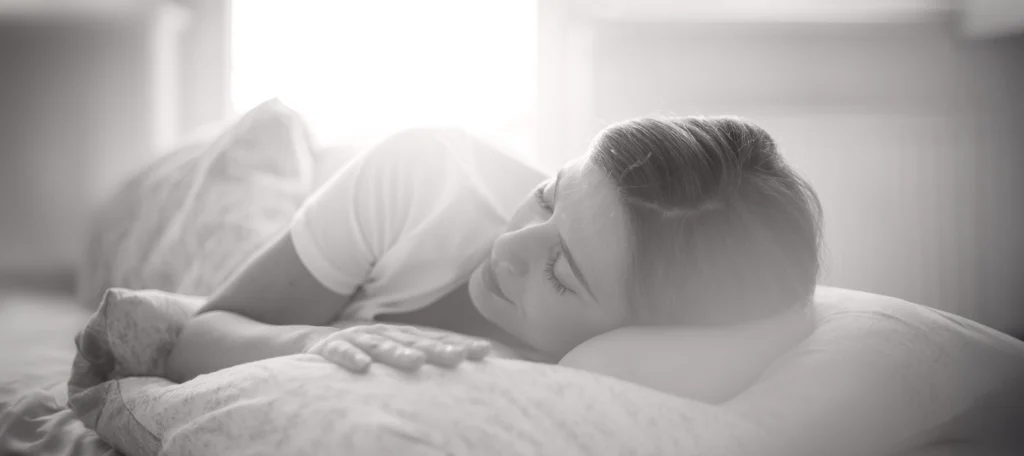
Sleep helps you rest and repair your body and mind, and it’s vital for your wellbeing. But if the land of nod evades you, not sleeping can be stressful in itself. That’s where The Sleep Geek can help.
Put away the sleep trackers and leave the imaginary sheep in their pens. It’s time to stop beating yourself up about being a bad sleeper – and odds on you’ll become a better one in the process.
This is the advice of James ‘The Sleep Geek’ Wilson, a Yorkshire-based sleep expert, who has dedicated his life to helping people overcome their bedtime frustrations in a guilt-free way.
Instead of handing out a list of dos and don’ts – like stopping looking at your phone, aiming for eight hours a night, being in bed by 10pm – he encourages people to start by gaining a better understanding of themselves and their own individual sleep needs.
James says: “Poor sleep is mostly a condition of the mind and we’ve turned it into something like dieting or exercise where it’s ‘if you do XYZ, then you’ll get ABC’.
“I don’t want people obsessed with sleep. I want them to understand their sleep pattern and get it to fit into their lives to make them happier, and to make them better people. If we’ve slept well we are the best version of ourselves.”
If you’ve ruled out an uncomfortable mattress or pillow, or a physical condition such as sleep apnoea, as the cause of your restless nights, then James says you have to start by working out what your body needs.
He advises clients not to pay attention to supposed ‘facts’ about sleep, such as everyone needing eight hours of shut-eye per night. As with most things in life, we’re all different and have different requirements. Most people need between six and nine hours, depending on their bodies, their age and their gene pool. Some are naturally early risers, which James calls ‘larks’, and then there are the ‘owls’ who function better if they stay up, and get up, later.
“One of the big mistakes we make is that we try to fall asleep at times that don’t suit us,” says James.
“If you’re a bit of an owl, trying to go to bed at eight o’clock isn’t going to work and getting up at five in the morning to exercise isn’t going to work for you either.”
However, it is important to have a consistent wake-up time because that’s likely to lead to a regular sleep time.
The hidden culprit: Stress and Its impact on sleep
However, what The Sleep Geek says is a constant pattern among his clients is that the biggest single cause of poor sleep is stress, whether that’s something that has been bothering us at work, worrying about a family member or a lack of trust for the person you are sharing a bed with.
Stress can lead to an inability to switch off, which is often a gnarly issue for problem solvers with a touch of perfectionism. That serves them well at work, but prevents them from winding down in the evening. When exhausted, they fall asleep quickly but then wake in the early hours, unable to lull themselves back to slumber.
In this situation, a bedtime wind down routine is crucial. While, contrary to popular belief, the light from a phone’s screen won’t keep you awake, what you choose to do on your phone might.
“You can go from looking at social media and being really, really agitated at people from school, to watching something funny or using an app like Headspace or listening to a calming playlist,” says James.
As for TV: “If you’re watching Question Time, they’re going to be shouting at each other. It’s very aggressive. If you’re watching true crime – it’s happened and it’s scary. Better to watch something that makes you laugh and get some endorphins released.”
Another major factor in poor sleep is what – or rather who – James calls ‘sleep disruptors’. Even if you and your partner are perfectly compatible during waking hours, you can be total opposites at night. Tackling this takes a compassionate conversation, he says. If one of you is kept awake by the other’s reading light, can they do it in another room? If one of you is hot and the other cold, get two duvets.
“I would say people need to buy bigger beds, because with double beds you have less space as an adult than a baby has in a cot bed – and then some people put a golden retriever between them too!”
Without a strict eight-hour goal, how do you know if you’ve had enough sleep? James says it is all about the way you actually feel.
“Sleep need is not a number, it’s a feeling,” he says. “At 10 or 11 in the morning, you should be at your most alert, and if you are then you’ve met your sleep need.”
And if, even after trying all this, you find yourself awake at 3am worrying about how you’ll cope with the day ahead? Shift the way you’re thinking, advises James: “Don’t beat yourself up for being rubbish at sleeping, think ‘I am brilliant at being tired. I will get through tomorrow.’”
One of the big mistakes we make is that we try to fall asleep at times that don’t suit us
10 TIPS FROM THE SLEEP GEEK
- Don’t ignore sleep cues. If your body is telling you it’s ready for bed, don’t put on another episode of the box set – hit the pillow instead.
- Choose TV programmes that will make you feel calm and happy instead of anxious.
- Social media can wait until morning. Pick a relaxation app or playlist instead.
- Take time for a compassionate conversation with your partner about your sleep needs.
- Buy a bigger bed!
- Don’t let pets sleep with you if they are disturbing your sleep. Cats are a particular problem as they are nocturnal.
- Avoid caffeine in the late afternoon if you struggle to get to sleep or wake in the night.
- Don’t eat close to bedtime. Digesting food raises your core temperature when you need to be cooler to sleep.
- Avoid long weekend lie-ins. Anything more than an hour and a half shifts your sleep routine.
- Listen to your body.


